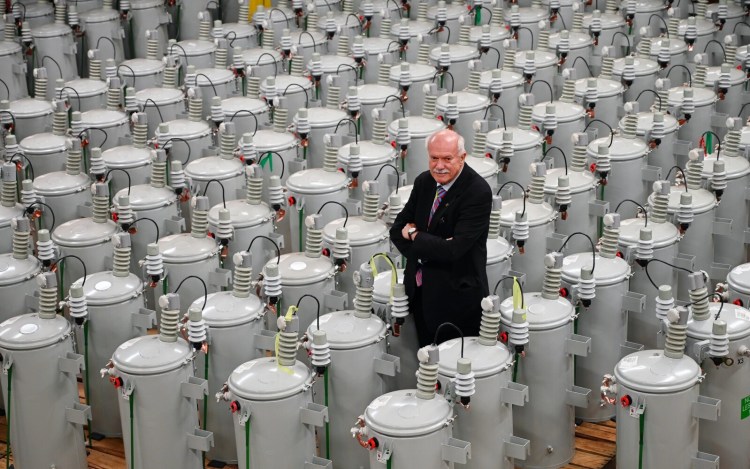David Flanagan, a Maine business and civic icon for more than 40 years and the current executive chairman of Central Maine Power Co., confirmed Wednesday that he is battling pancreatic cancer.
Flanagan, 74, said that he initially had no symptoms and that his illness was discovered last fall through routine medical tests. He said he’s undergoing twice-weekly treatments at the Harold Alfond Center for Cancer Care in Augusta.
Flanagan said his condition and treatment have left him with low energy levels. Accustomed to working up to 12 hours a day, Flanagan said he has had to cut his schedule in half and mostly stay at home. Frustration is the word he said he’d use to describe his current state of mind.
“The damn thing is, I still enjoy the work,” he said in an exclusive interview with the Portland Press Herald on Wednesday. “I know how to do this. I wish I could do it more.”
Flanagan publicly revealed his illness the same day that Joseph A. Purington, president of operations for Eversource Energy in New Hampshire, was appointed CMP’s next president and chief executive. Purington will replace interim President and CEO Scott Mahoney, who will return to top management roles at Avangrid, CMP’s domestic parent company based in Connecticut.
Flanagan will take on the less demanding role of senior adviser when Purington takes over at the end of September.
These transitions are taking place during a critical time for what is perhaps Maine’s most heavily scrutinized company, with its actions judged on an almost-daily basis by customers, critics, regulators and politicians.
CMP is facing a variety of challenges, ranging from attempts by opponents to cripple a high-voltage power line project that an Avangrid subsidiary is building in western Maine to a possible referendum to replace investor-owned utilities with a consumer-owned model. Meanwhile, state polices aimed at shifting the energy sector from fossil fuels to clean electricity are increasing demands on Maine’s largest electric utility, just as more intense storms fueled by climate change are threatening system reliability.
Flanagan served as CMP’s chief executive from 1994 to 2000. During that time, he led a company turnaround that resulted in a high public favorability rating. He was widely credited for his leadership in restoring power during the landmark 1998 ice storm.
After leaving CMP, Flanagan lent his turnaround expertise to other organizations, including helping to restructure the University of Southern Maine, where he was a longtime board member and served as interim president in 2014.
In February of 2020, Flanagan stepped out of retirement to become executive chairman of CMP’s board. His task was to rebuild customer trust that had eroded after a series of missteps, highlighted by the faulty rollout of a new billing system in 2017.
Flanagan said Wednesday that he has made progress tackling customer service shortfalls during his 18 months on the job. He pointed specifically to rapid power restoration following a powerful April 2020 snowstorm that impacted 280,000 customers. Metrics tracked by state regulators also have rebounded for billing accuracy and call center response, he noted.
Increased customer satisfaction, he said, also has been reflected in internal polling that shows customer favorability ratings doubling between February 2020 and January 2021. Those internal numbers don’t reflect widely cited figures from recent J.D. Power national surveys that show CMP ranking last in a nationwide survey of business customers’ opinions of their utility companies.
But now, Flanagan must turn his attention more pressing statistics.
Cancer of the pancreas is especially insidious because it strikes an organ that is difficult to monitor, making it hard to detect in the early stages when it’s most curable. It often doesn’t cause symptoms until after spreading to other organs, according to the Mayo Clinic. Treatment options include chemotherapy, radiation and surgery.
Pancreatic cancer gained a higher profile last year with the news that “Jeopardy” game show host Alex Trebek was diagnosed with a Stage 4 level of the disease in March 2019. Through several rounds of chemotherapy, Trebek conducted a very public fight aimed at raising awareness of the warnings signs of this life-threatening cancer, which in his case included persistent stomach pain. He died last November at age 80.
Flanagan declined to discuss the details of his diagnosis, but alluded to Trebek with humor.
“Like a lot of prominent people,” he said, “I’m in jeopardy.”
Flanagan’s self-effacing demeanor belies his Harvard education, Boston College legal degree and stature in Maine’s business community. A Bangor native, he has sought to stay grounded to his Maine roots, saying he decided long ago not to pursue more lucrative executive positions that would have taken him out of state.
“This has been a time of reflection for me,” he said Wednesday. “I’ve spent my whole life working on behalf of Maine people, companies and government.”
Flanagan said he feels blessed to have been able to live and work in Maine, and treasures the variety of experiences he has had, with no regrets.
“I feel good about it,” he said. “I wish I had a little more time. But I feel I’ve done the best I could.”
Comments are not available on this story.
Send questions/comments to the editors.



